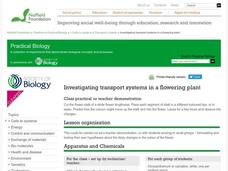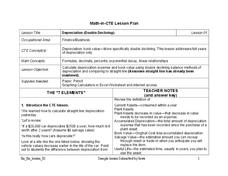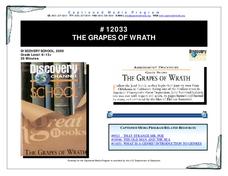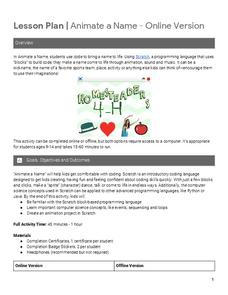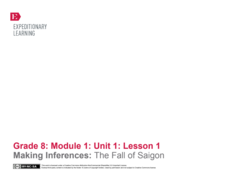Stanford University
Letter from Birmingham Jail: The Power of Nonviolent Direct Action
What strategies are most effective in changing an unjust law? Class members examine the tactics used in the Birmingham Campaign of 1963 (Project C) to achieve social justice and social transformation. After examining documents that...
Nuffield Foundation
Investigating Transport Systems in a Flowering Plant
Some weddings have flowers in a unique, unnatural color to match the theme. Young scientists take part in this process to learn about the function of the xylem as they observe colored water moving through a flower. Then, they experiment...
National Research Center for Career and Technical Education
Depreciation (Double Declining)
Have you ever been told that your new car begins to lose its value as soon as you drive it off the lot? Aspiring accountants take on the concepts of depreciation and book value through an easy-to-deliver career and technology lesson. The...
National Research Center for Career and Technical Education
Photoshop Scale
Say cheese! Can your class take a great photo and size it to fit any need? A career and technology-centered lesson plan demonstrates the correct way to resize images in Adobe Photoshop. Scholars view a presentation and work individually...
Prestwick House
Vocabulary in Context: Wilderness Survival
Do you have what it takes to survive in the wilderness? A high-interest reading passage offers practical advice while incorporating vocabulary practice. Follow-up worksheets focus on skills such as defining words, making inferences, and...
PBS
The Media and the War: The Penny Press, Walt Whitman and the War
The Mexican-American war marked a significant moment in United States history, as well as in the history of American media. The mid-nineteenth century saw the introduction of the Penny Press, which provided many American citizens with...
Captioned Media
Creating Dramatic Monologues from The Grapes of Wrath
Set in Oklahoma in the 1930s, The Grapes of Wrath presents a powerful view of life during the Great Depression. An insightful lesson plan takes a closer look at the characters in John Steinbeck's classic novel, combining the descriptions...
Google
Animate a Name
What's in a name? Pupils use the Scratch code blocks to animate letters in a name. They learn about events, sequencing, and loops in computer science by taking part in the project.
Serendip
Understanding the Biology of Cancer
After initial exposure to a carcinogen, a cancer diagnosis often takes more than a decade due to the slow buildup of mutated cells in the body. Scholars learn about the biology of cancer with a worksheet and discussion questions. They...
Serendip
Changing Biological Communities – Disturbance and Succession
After cutting down a forest to make a farm, how long would it take the environment to turn an abandoned farm back into a forest? Scholars study this exact scenario while they interpret many charts and graphs of the changing ecosystems as...
EngageNY
Making Inferences: The Fall of Saigon
Get hooked! Reel in and hook scholars to the unit with a slide show, text-based activity, and reading exercises. To increase curiosity, learners read only small pieces of Panic Rises in Saigon, but the Exits Are Few. Readers use the...
EngageNY
Mid Unit 2 Assessment: Text to Film and Perspective Comparison of to Kill a Mockingbird (Chapter 18 and One Scene from Chapter 19)
Have you ever heard someone say the movie is not like the book? Scholars complete a mid-unit assessment to compare scenes from the novel To Kill a Mockingbird to the movie version. The assessment contains short answers, multiple choice,...
EngageNY
End of Unit Assessment: Analysis of Language Techniques
Watch your language! Scholars work on an end-of-unit assessment in which they demonstrate the language skills they learned. Questions ask readers to work with different types of verbs and moods all about the text in Unbroken.
Alabama Wildlife Federation
How Many Butterflies
Learners become butterflies to complete an activity that has them collect tokens that represent food, water, and shelter. They must collect their necessities while in competition with other butterflies in the same area. Once the...
Stanford University
Hurricane Katrina
The adage says that journalism is the first draft of history. How should people evaluate these sources of information? Taking into account various sources, including those from various perspectives and different creators, learners...
EngageNY
Module Reflection and Writing Book Reviews
Scholars take time to reflect on the unit and the end-of-unit writing assessment. They use a Working Conditions Reflection to help guide them through the exercise. Readers then begin working on a book review for the book they have been...
Encyclopedia Britannica
Political Issue Timeline
As part of a study of US Presidential elections, class members track the history of an issue in the 2020 campaign. They create a timeline to determine if there are any patterns, if ideas about the issue have evolved, or if in issue is no...
Facing History and Ourselves
Insights on Democracy from South Africa
As part of their study of democracy, high schoolers listen to a podcast featuring two South African educators and their efforts to support the process of transforming the nation from apartheid rule into a democracy. Learners also read...
Facing History and Ourselves
Citizen Power Makes Democracy Work
Eric Liu's formula "power plus character equals citizenship" and his three strategies to making change happen model for high schoolers how to develop citizen power, how to get involved and participate to make democracy work. Class...
Facing History and Ourselves
Free Press Makes Democracy Work
A unit study of the importance of a free press in a democracy begins with class members listening to a podcast featuring two journalists, one from a United States public radio station and one from Capetown, South Africa. The lesson plan,...
Facing History and Ourselves
Violence and Backlash
Revolution and counterrevolution. Protest and counter-protest. Collaborators and bystanders. The focus of the fifth resource in the Reconstruction Era and Fragility of Democracy series is on the political violence that followed Radical...
EngageNY
Writing to Inform: Analyzing a Model Using a Rubric
Learn to write right. Scholars analyze the model essay Adversity Faced by Townspeople in the Middle Ages. They discuss the essay and make annotations working with an elbow partner. Learners then take another look at the essay using a...
Scholastic
Pilgrim and Wampanoag Daily Life for Grades 6–8
Two slide shows, viewed side-by-side, permit middle schoolers to compare and contrast the lives of the Pilgrims of the Plimoth colony and the Wampanoags. Four videos take learners on virtual field trips to the Plymouth plantation. And an...
EngageNY
Reading for Gist: “Middle Ages” Excerpt 1
Dig deep. Scholars dig deep for meaning while reading Middle Ages Excerpt 1. They begin by finding unfamiliar words and adding them to a word catcher. Pupils then take a close look at adversity in the text and complete an anchor chart.
Other popular searches
- Taking Notes While Listening
- Taking Notes for Research
- Note Cards Taking Notes
- Taking Notes and Nonfiction
- Research Taking Notes
- Taking Notes for Math
- Taking Notes for Papers
- Language Arts Taking Notes
- Taking Notes on Articles
- Taking Notes Lesson Plans
- Taking Notes While Reading
- Taking Notes During a Video



